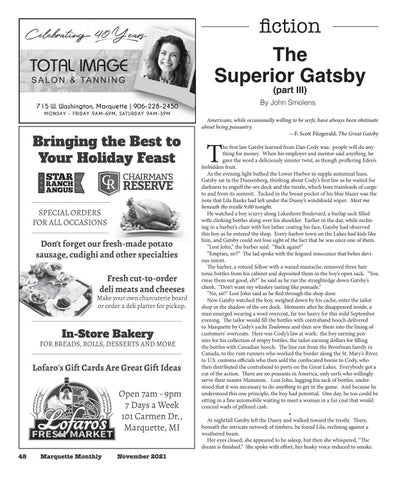fiction
The Superior Gatsby (part III)
By John Smolens Americans, while occasionally willing to be serfs, have always been obstinate about being peasantry. —F. Scott Fitzgerald, The Great Gatsby
T
he first law Gatsby learned from Dan Cody was: people will do anything for money. When his employer and mentor said anything, he gave the word a deliciously sinister twist, as though proffering Eden’s forbidden fruit. As the evening light bathed the Lower Harbor in supple autumnal hues, Gatsby sat in the Duesenberg, thinking about Cody’s first law as he waited for darkness to engulf the ore dock and the trestle, which bore trainloads of cargo to and from its summit. Tucked in the breast pocket of his blue blazer was the note that Lila Banks had left under the Duesy’s windshield wiper: Meet me beneath the trestle 9:00 tonight. He watched a boy scurry along Lakeshore Boulevard, a burlap sack filled with clinking bottles slung over his shoulder. Earlier in the day, while reclining in a barber’s chair with hot lather coating his face, Gatsby had observed this boy as he entered the shop. Every harbor town on the Lakes had kids like him, and Gatsby could not lose sight of the fact that he was once one of them. “Lost John,” the barber said. “Back again?” “Empties, sir?” The lad spoke with the feigned innocence that belies devious intent. The barber, a rotund fellow with a waxed mustache, removed three hair tonic bottles from his cabinet and deposited them in the boy’s open sack. “You rinse them out good, eh?” he said as he ran the straightedge down Gatsby’s cheek. “Don’t want my whiskey tasting like pomade.” “No, sir!” Lost John said as he fled through the shop door. Now Gatsby watched the boy, weighed down by his cache, enter the tailor shop in the shadow of the ore dock. Moments after he disappeared inside, a man emerged wearing a wool overcoat, far too heavy for this mild September evening. The tailor would fill the bottles with contraband hooch delivered to Marquette by Cody’s yacht Toulomee and then sew them into the lining of customers’ overcoats. Here was Cody’s law at work: the boy earning pennies for his collection of empty bottles, the tailor earning dollars for filling the bottles with Canadian hooch. The line ran from the Bronfman family in Canada, to the rum runners who worked the border along the St. Mary’s River, to U.S. customs officials who then sold the confiscated booze to Cody, who then distributed the contraband to ports on the Great Lakes. Everybody got a cut of the action. There are no peasants in America, only serfs who willingly serve their master Mammon. Lost John, lugging his sack of bottles, understood that it was necessary to do anything to get in the game. And because he understood this one principle, the boy had potential. One day, he too could be sitting in a fine automobile waiting to meet a woman in a fur coat that would conceal wads of pilfered cash. • At nightfall Gatsby left the Duesy and walked toward the trestle. There, beneath the intricate network of timbers, he found Lila, reclining against a weathered beam. Her eyes closed, she appeared to be asleep, but then she whispered, “The dream is finished.” She spoke with effort, her husky voice reduced to smoke.
48
Marquette Monthly
November 2021




















